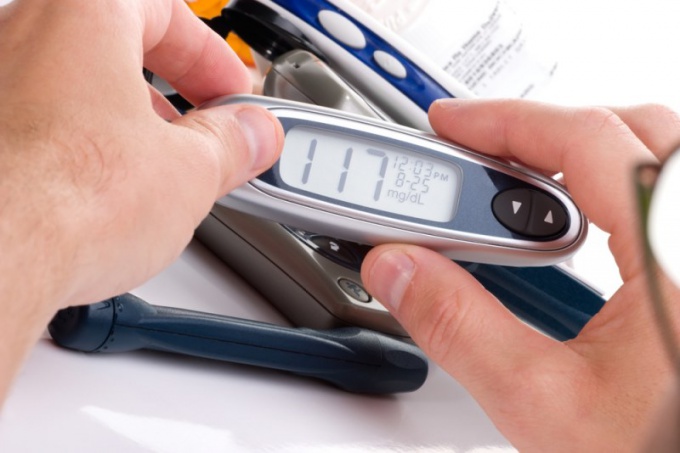Measurement of blood sugar is necessary for evaluating the effectiveness of treatment of diabetes and the dose adjustment of drugs. From the therapy depends on how many times a month you will need to measure the sugar. Sometimes a blood analysis is needed many times during the day, sometimes just 1-2 times a week. Self-control is especially necessary for pregnant women and patients with type 1 diabetes.
The meter is not considered a precision instrument. It is designed only for approximate determination of the concentration of sugar in the blood.
The permissible error of the meter according to the world standards is 20% at glucose 4.2 mmol/L.
For example, if the self-control level sugar 5 mmol/l, the actual concentration value is in the range from 4 to 6 mmol/L.
The permissible error of the meter under standard conditions is measured in percentage and not in mg/DL. the higher, the larger the error in absolute numbers. For example, if the blood sugar reaches about 10 mmol/l, the error does not exceed 2 mmol/l, and if the sugar is about 20 mmol/l, the difference with results from laboratory measurements can be up to 4 mmol/L.
The standards allow for the excess of the stated measurement error in 5% of cases. This means that every twentieth research can significantly distort the results.
The meters are subject to mandatory certification. The accompanying device documents usually given the numbers of permissible measurement error. If you do not see in the instructions, the inaccuracy is 20%.
Some manufacturers of blood glucose meters, pay special attention to the accuracy of the measurements. There are devices for European companies, which have a margin of error of less than 20%. The best indicator to date is 10-15%.
Permissible error of measurement that describes the operation of the device. On the accuracy of the study is influenced by some other factors. Improperly prepared skin, too small or large the volume of the resulting drop of blood, unacceptable temperature mode - all this can lead to errors.
Only if all rules are self-enforced, you can count on the declared margin of error of the study.
The accuracy of the meter can be checked at the service center. The warranty obligations of the manufacturers provide free advice and Troubleshooting.
The permissible error of the meter according to the world standards
The meter is not considered a precision instrument. It is designed only for approximate determination of the concentration of sugar in the blood.
The permissible error of the meter according to the world standards is 20% at glucose 4.2 mmol/L.
For example, if the self-control level sugar 5 mmol/l, the actual concentration value is in the range from 4 to 6 mmol/L.
The permissible error of the meter under standard conditions is measured in percentage and not in mg/DL. the higher, the larger the error in absolute numbers. For example, if the blood sugar reaches about 10 mmol/l, the error does not exceed 2 mmol/l, and if the sugar is about 20 mmol/l, the difference with results from laboratory measurements can be up to 4 mmol/L.
In most cases, the meter overestimates the indicators of glycemia.
The standards allow for the excess of the stated measurement error in 5% of cases. This means that every twentieth research can significantly distort the results.
The margin of error of the blood glucose meters of different companies
The meters are subject to mandatory certification. The accompanying device documents usually given the numbers of permissible measurement error. If you do not see in the instructions, the inaccuracy is 20%.
Some manufacturers of blood glucose meters, pay special attention to the accuracy of the measurements. There are devices for European companies, which have a margin of error of less than 20%. The best indicator to date is 10-15%.
The error of the meter with self-control
Permissible error of measurement that describes the operation of the device. On the accuracy of the study is influenced by some other factors. Improperly prepared skin, too small or large the volume of the resulting drop of blood, unacceptable temperature mode - all this can lead to errors.
Only if all rules are self-enforced, you can count on the declared margin of error of the study.
Rules of self-control with the help of a glucometer can be obtained from the attending physician.
The accuracy of the meter can be checked at the service center. The warranty obligations of the manufacturers provide free advice and Troubleshooting.
